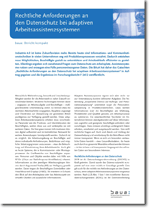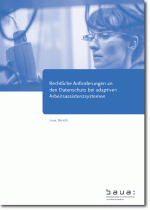- Project number: F 2412
- Institution: occupational science support: Federal Institute for Occupational Safety and Health (BAuA)
- Status: Completed Project
Description:
The overall objective of the joint Glass@Service project was the partial development of Augmented Reality (AR) smart glasses as a work assistance system, considering the competitiveness of companies as well as a humane work design based on use cases from electronics manufacturing. In this respect, BAuA addressed the existing ergonomic challenges in order to prevent risks to the safety and health of employees. In addition, the tasks of BAuA encompassed legally clarifying the restrictions surrounding data protection in the run-up to a technology introduction and evaluating the developed prototype with regard to the factors of acceptance, usability and strain.
During the initial creation of the specifications sheet, BAuA drew up the requirements for the introduction of a work assistance system based on smart glasses, especially from the perspective of occupational science. This encompassed, among others, the general application criteria (e. g. BAuA Guidance on Head-Mounted Displays), occupational health and safety requirements as defined in standardisation (e. g. the requirements of safety glasses according to DIN EN 166), and the requirements regarding the configuration of human-system interfaces (e. g. DIN EN ISO 9241).
As regards to the area of data protection, BAuA was able to issue a data protection report. The results of the report were presented at the 7th expert workshop on smart glasses hosted by BAuA on 7th March 2018 in Dortmund, and published in the BAuA report on “Data protection requirements for the application of adaptive work assistance systems.” This report describes all key changes that have arisen due to the EU GDPR and also provides, among others, a data protection check-list.
The evaluation of work assistance systems based on smart glasses revealed that for employees in an efficiency-driven manufacturing environment, ease of use, wearing comfort and clearly defined benefits are the key factors regarding the introduction of a new form of work assistance technology. In this respect, as a technology which is not yet fully mature, data glasses still have significant disadvantages in comparison with technology commonly used in everyday life, such as tablet PCs, smartphones or smartwatches. For the successful use of smart glasses, it is particularly important to consider the task technology fit, whereby it is to clarify to what extent criteria that argue for the use of smart glasses (hands-free operation, mobility, etc.) are a necessary requirement for the tasks. In respect to the rapid developments in the field of electronics, it is to expect that smart glasses will also offer superior wearing comfort and simpler application concepts in the near future. Therefore, it is important to continue following the development of the technology in order to identify the potential support for employees.

